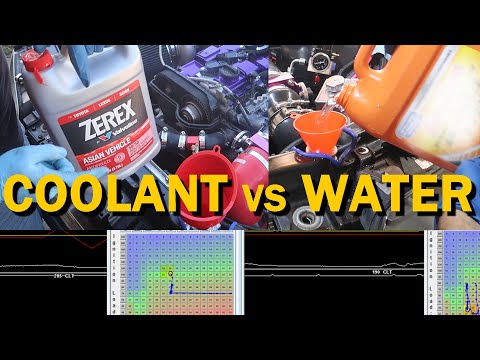A coolant is very important for a vehicle’s engine. Because it stops the engine from overheating and keeps it performing at its best.
But can you use water as coolant in your car? Yes, but there are a lot of critical considerations to make first. When water is used as a coolant in some engines, it can lead to rust, corrosion, and ineffective heat transfer. However, this is not the case in all engines.
In this article, we will discuss the benefits and drawbacks of employing water as a coolant, investigate other alternatives to water, and offer some advice regarding preventative maintenance.
The Importance of Coolant in Preventing Engine Overheating

The coolant in a car is an important part that helps keep the engine from getting too hot and keeps it running at its best. The importance of coolant in preventing the engine from overheating are:
- Controls engine temperature: Coolant is key to keeping your car’s engine at the right temperature. Without it, the engine would quickly get too hot and break down or get damaged.
- Prevents corrosion: Corrosion is stopped by additives in the coolant that keep rust and corrosion from building up in the engine and radiator. This helps your engine last longer and saves you money on repairs.
- Increases Fuel Efficiency: A heated engine can result in a reduction in fuel efficiency. Maintaining the ideal engine temperature and ensuring maximum fuel economy are both made possible by coolant.
- Reduces Emissions: Overheating can raise emissions by causing the engine to produce more pollution than it should. Coolant assists in maintaining the engine’s ideal operating temperature. It lowers hazardous emissions.
- Lubricates moving parts: The coolant also helps to lubricate moving parts in the engine, which reduces friction and wear. This can help improve the way your car runs and make it last longer.
- Helps to protect against freezing or boiling: Coolant, Antifreeze, a mixture of chemicals and water, keeps the liquid inside the radiators from freezing in the winter. Mixture of coolant and water prevents boiling over in the summer (overheating the engine).
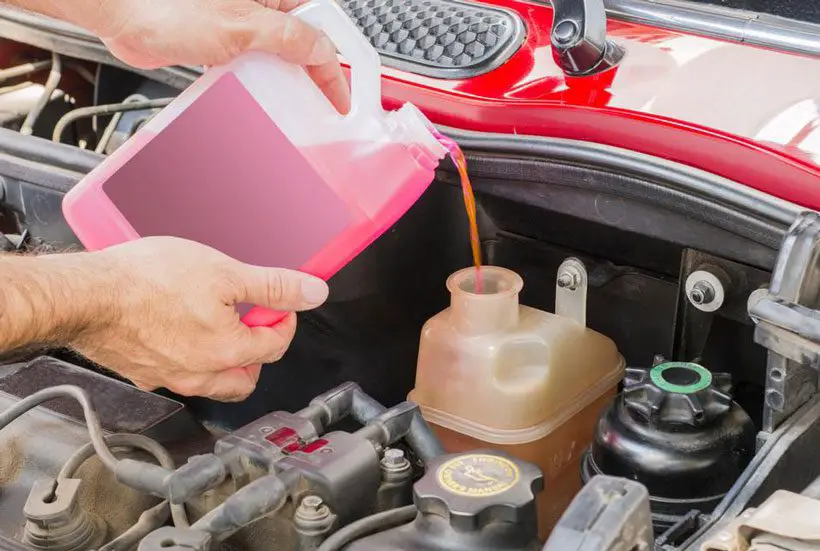
In short, the coolant system is a key part of keeping your engine from overheating and making sure it works well and lasts a long time. The coolant system needs to be checked and serviced regularly to avoid costly repairs and breakdowns.
Different Types of Coolants for Different Types of Engines
There are a variety of coolants available, each of which is optimized for certain engine types and functioning factors. Using the correct coolant for your engine is essential to avoid damage and maintain peak performance.
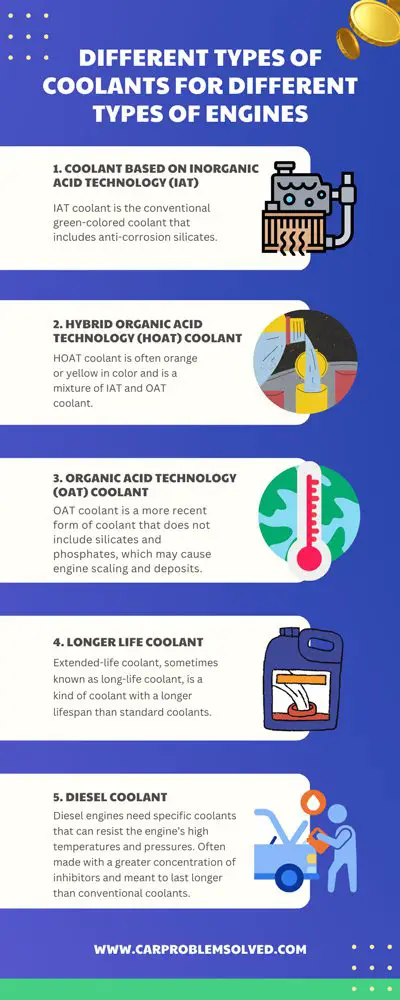
Below are the five coolant types:
1. Coolant based on Inorganic Acid Technology (IAT)
IAT coolant is the conventional green-colored coolant that includes anti-corrosion silicates. It is advised for older automobiles with copper or brass radiators and iron engine blocks.
Nonetheless, it must be replaced every two years or every thirty thousand kilometers.
2. Hybrid Organic Acid Technology (HOAT) Coolant
HOAT coolant is often orange or yellow in color and is a mixture of IAT and OAT coolant. It comprises a combination of silicates and organic acids that provide superior corrosion prevention compared to IAT coolant alone.
However, it is suggested for use in cars with aluminum radiators and engines has a service life of up to five years or 150,000 km.
3. Organic Acid Technology (OAT) Coolant
OAT coolant is a more recent form of coolant that does not include silicates and phosphates, which may cause engine scaling and deposits. It is suggested for modern automobiles with aluminum engines and radiators. The color of OAT coolant is often red, pink, or blue in hue.
It has a lifespan of up to 5 years or 150,000 miles and is less hazardous to the environment than conventional coolants.
4. Longer Life Coolant
Extended-life coolant, sometimes known as long-life coolant, is a kind of coolant with a longer lifespan than standard coolants. Typically, it is a blend of ethylene and propylene glycols and includes inhibitors that prevent engine damage and deposit formation.

It is indicated for use in automobiles with aluminum engines or radiators and has a maximum lifespan of five years or 150,000 miles.
5. Diesel Coolant
Diesel engines need specific coolants that can resist the engine’s high temperatures and pressures. Often made with a greater concentration of inhibitors and meant to last longer than conventional coolants.
This is often red or pink in hue, and diesel coolants may last up to six years or 600,000 miles.
Pros of Using Water as Coolant
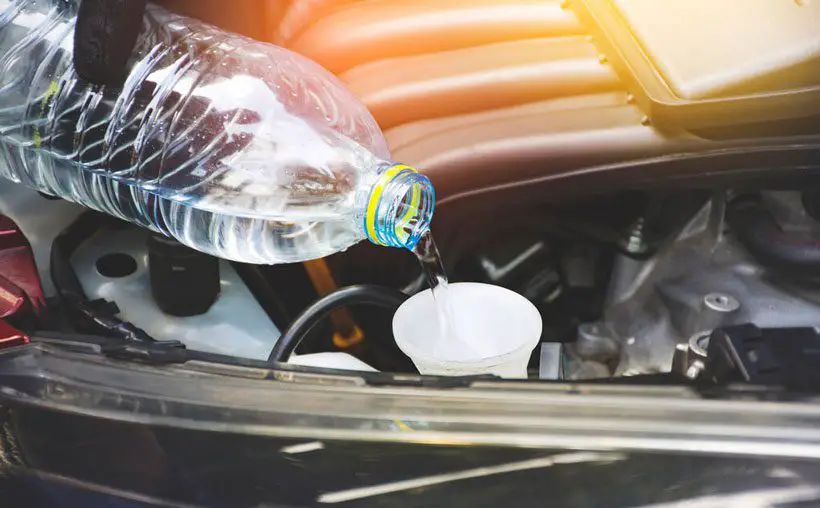
The following are some of the many advantages of using water as a coolant:
Inexpensive
Since water is much cheaper than commercial coolants, many car owners choose to use it instead. If you don’t want to spend a lot of money on coolant or are on a tight budget, water can be a cheap alternative.
Widely Available
Water is also easy for most car owners to get because it is easy to find. Most gas stations, convenience stores, and even your own home have water. So it’s easy to use to add more coolant or flush your system.
Other pros of using water as a coolant are that water is environment friendly, easy to replace, and there is no risk of poisoning while working with water.
But it’s important to remember that even though water is a cheap and easy-to-find option for a coolant, it has some major problems that need to be considered. Here is a video about the comparison of water and coolant.
Cons of Using Water as Coolant
Here are some cons of using water instead of coolant.
It Can Cause Rust and Corrosion
The fact that water might eventually cause oxidation and corrosion in the engine. And this is one of the biggest disadvantages of utilizing water as a coolant. This is so that metal surfaces won’t rust or corrode since water includes minerals that can interact with metal surfaces.
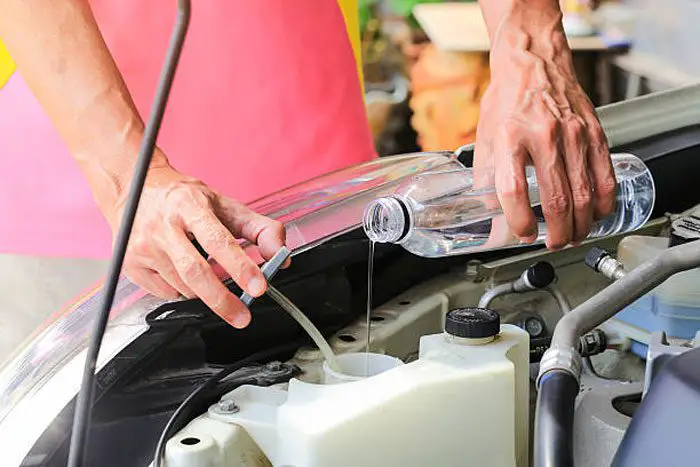
Use proper coolant in its place because this can result in severe engine damage if left uncontrolled.
Not as Effective Heat Transfer as Proper Coolant
Water is also less effective than a coolant at transferring heat. Coolant can absorb and dissipate your engine’s heat, which helps keep it from overheating.
But water, if it doesn’t adequately transmit heat away from the engine, the engine will start to overheat. If this isn’t fixed, it could seriously harm your engine.
Other drawbacks are that water is susceptible to bacterial growth and has limited protection against freezing, boiling, cavitation, and foam formation. Additionally, water is not suitable for all types of engines.
Alternatives to Using Water as Coolant
Propylene glycol and ethylene glycol coolants are superior choices to water as a coolant. They are more efficient at driving heat away from the engine since they are made expressly to stop the engine from overheating and corrosion.

Below are two alternatives to using water as a coolant.
1. Ethylene Glycol Coolant
Ethylene glycol is a popular alternative to coolant. It prevents engine overheating and rust. Ethylene glycol coolant transfers heat better than water, preventing engine overheating. Additives prevent engine rust and corrosion.
2. Propylene Glycol Coolant
Another cooling option is propylene glycol. It is safer and greener than ethylene glycol coolant. Propylene glycol coolant prevents the engine from overheating and corrosion. It transfers engine heat and prevents rust and corrosion like ethylene glycol coolant.
Each option has its pros and cons, and you should consider them before deciding which coolant to use in your car. People often use ethylene glycol coolant because it moves heat better and protects against corrosion better than water.
Propylene glycol coolant is safer for the environment and less dangerous to humans. However, it may not protect against corrosion as well as ethylene glycol coolant.
Preventive Maintenance Tips for Avoiding Coolant-Related Problems
These preventative maintenance measures can help keep your car’s coolant system in excellent shape and prevent overheating.

Regular Maintenance
Regular engine maintenance is essential. The manufacturer recommends replacing the coolant every 2-5 years or 30,000–50,000 kilometers.
Coolant System Checks
Inspect your coolant system frequently for leaks and damage. Inspect the radiator, hoses, and water pump for cracks, leaks, or other problems that might leak coolant.
Monitoring Temperature Gauge
Monitor the temperature gauge regularly while driving. Stop if the gauge indicates overheating. Overheating might damage your engine, so act quickly.
If you’re wondering whether you can use water as coolant in your car, you may also be interested in our articles on using distilled water as coolant and can you add water to the coolant. The article on using distilled water as coolant provides insights into the benefits and considerations of using distilled water in your car’s cooling system. Additionally, the article on adding water to the coolant discusses the situations where adding water might be necessary and the precautions to keep in mind. These resources offer valuable information to help you make informed decisions about maintaining the cooling system in your car.Conclusion
In the end, there are pros and cons to using water as a coolant in a car engine. Even though it is cheap and easy to find, it can cause rust and corrosion and doesn’t transfer heat as well as proper coolant. So, it’s important to carefully consider both the pros and cons.
Moreover, it is best to use the right coolant to keep the engine from getting damaged, such as ethylene glycol or propylene glycol coolant. Also, problems with the coolant can be avoided with regular maintenance and monitoring of the system, like checking the temperature gauge.

